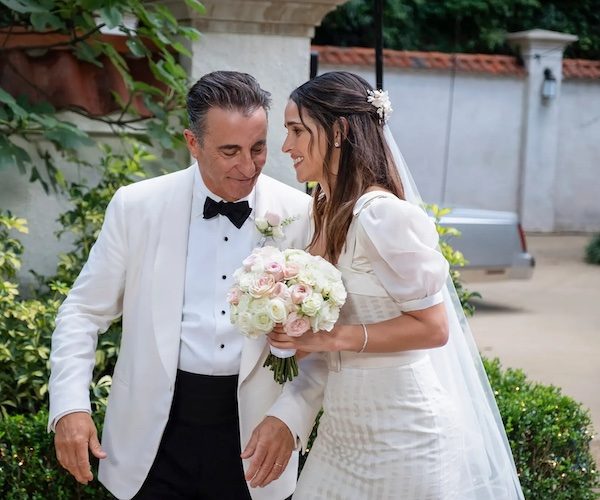Film Review: “Father of the Bride” — Needlessly Recycled
By Sarah Osman
It’s welcome to have a Latino-centered Father of the Bride, but it’s debatable if we really needed one this clumsily put together.
Father of the Bride, directed by Gary Alazaraki. Streaming on HBO Max.

Andy Garcia as Billy and Adria Arjona as his daughter Sofia in Father of the Bride. Photo: Claudette Barius/Warner Bros./HBO Max
There are as many comedies as there are different kinds of pratfalls. And, because the roots of humor are so ambiguous — Freud said that jokes are expressions of veiled hostility — one cannot always clearly say that a comedy is just a comedy. And that explains why there are so many sub-comedy genres: the “rom-com,” “the horror-comedy,” “the dramedy.” The latest iteration of the oft-filmed story Father of the Bride is billed as a comedy, but given that it deals with some abrasive issues and personalities, it’s not exactly a barrel of laughs.
There have been three film versions (fourth counting the original novel) of Father of the Bride. Each has followed roughly the same plot: a father learns his daughter is getting married and freaks out over losing his baby girl (and over the hefty price tag for the ceremony and reception). Each movie reflects the mores of the time period it’s set in (1950, 1991, and 2022), so it’s not surprising that the 2022 outing is the most progressive of the lot. What’s baffling is that the first two were goofy family comedies, most of the farce aimed at the awkward titular father. Director Gary Alazaraki’s astringent take on the patriarch is not as lighthearted.
Andy Garcia stars as Billy Herrera, a Cuban immigrant who arrived in America with a dollar in his pocket (the details in his Horatio Alger story vary) and built an impressive architecture empire. He’s been married to Ingrid (Gloria Estefan, who gives an understated but captivating performance) for many years. She’s grown tired of being at the bottom of Billy’s to-do list. The pair have been in couples therapy for over a year and, after gaining a little psychological traction, Ingrid decides that it’s time for a divorce. There’s absolutely no discord between husband and wife in the narrative’s predecessors. But Billy and Ingrid are not the perfect couple. When their daughter Sofia (Adria Arjona) announces that she’s getting married, Billy and Ingrid agree to not say anything about their separation until after the wedding.
Kicking off the proceedings with a divorce in the making is a strange starting point for a rom-com, and it’s an even stranger way to commence a family comedy. Very little about Billy and Ingrid’s situation is played for laughs: these two people are very unhappy. Billy is also bothered by the fact that Sofia’s planning to marry her fiancé, Adan (Diego Boneta), after a very short courtship, and plans to move to Mexico with him to create a legal nonprofit. Billy is concerned Adan will not be a good provider, even though Sofia and Adan are not materialistic people. Billy’s internal thrashings are more in line with the protagonist of an indie drama rather than a commercial comedy. The film goes on to question what it means to be a “man” in today’s society, as well as to address the fact that success is defined differently by different generations (especially for immigrants). These social issues are raised, but Father of the Bride doesn’t have anything significant to say about them. It feels as if boxes are being checked off.
There are a few amusing running jokes and characters. Wedding planner Natalie (Chole Fineman) keeps referring to the family as being LatinX, much to Billy’s confusion. Billy’s relatives (led by the always amazing Ruben Ramos) keep pushing for Billy to let Ramos’s band play at the wedding. (The musicians end up having more fun at the bachelor party than the groom!) Adan’s fabulously wealthy family is much more fun than Billy’s, especially his father’s ex and his current wife, who pretend to fight just to mess with him. If only the film had more of these playful scenes and characters — it spends too much time concentrating on sourpuss Billy. Intense heart-to-hearts in most comedies don’t take place in a gentleman’s club, and if they do, they are not meant to be taken seriously.
The last act of Father of the Bride is the film’s best, as the members of the family finally come together to pull off the wedding they agreed to in the first place. Only in the windup are we given the madcap energy that’s so desperately needed earlier on. Still, unaccountably, plot threads are left dangling. Why were characters like Sofia’s younger sister with fashion designer dreams introduced in the first place? It’s welcome to have a Latino-centered Father of the Bride, but it’s debatable if we really needed one this clumsily put together. Like so many Hollywood remakes, this is an old story that didn’t need to be recycled.
Sarah Mina Osman is a writer residing in Wilmington, NC. In addition to writing for the Arts Fuse, she has written for Watercooler HQ, Huffington Post, HelloGiggles, Young Hollywood, and Matador Network, among other sites. Her work was included in the anthology Fury: Women’s Lived Experiences in the Trump Era. She is currently a first year fiction MFA candidate at the University of North Carolina Wilmington. When she’s not writing, she’s dancing, watching movies, traveling, or eating. She has a deep appreciation for sloths and tacos. You can keep up with her on Twitter and Instagram: @SarahMinaOsman
Tagged: Adria Arjona, Andy Garcia, Father of the Bride, Gary Alazaraki
